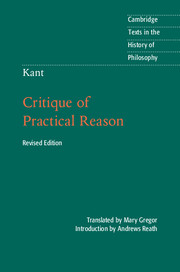Book contents
- Frontmatter
- Contents
- Introduction
- Chronology
- Further reading
- Note on the translation
- Critique of Practical Reason
- Preface
- Introduction On the idea of a critique of practical reason
- The critique of practical reason Part one Doctrine of the elements of pure practical reason
- Book I The analytic of pure practical reason
- Book II Dialectic of pure practical reason
- The critique of practical reason Part two Doctrine of the method of pure practical reason
- Conclusion
- Index
Book I - The analytic of pure practical reason
Published online by Cambridge University Press: 05 February 2015
- Frontmatter
- Contents
- Introduction
- Chronology
- Further reading
- Note on the translation
- Critique of Practical Reason
- Preface
- Introduction On the idea of a critique of practical reason
- The critique of practical reason Part one Doctrine of the elements of pure practical reason
- Book I The analytic of pure practical reason
- Book II Dialectic of pure practical reason
- The critique of practical reason Part two Doctrine of the method of pure practical reason
- Conclusion
- Index
Summary
DEFINITION
Practical principles are propositions that contain a general determination of the will, having under it several practical rules. They are subjective, or maxims, when the condition is regarded by the subject as holding only for his will; but they are objective, or practical laws, when the condition is cognized as objective, that is, as holding for the will of every rational being.
Remark
If it is assumed that pure reason can contain within itself a practical ground, that is, one sufficient to determine the will, then there are practical laws; otherwise all practical principles will be mere maxims. Within a pathologically affected will of a rational being there can be found a conflict of maxims with the practical laws cognized by himself. For example, someone can make it his maxim to let no insult pass unavenged and yet at the same time see that this is no practical law but only his maxim – that, on the contrary, as being in one and the same maxim a rule for the will of every rational being it could not harmonize with itself. In cognition of nature the principles of what happens (e.g., the principle of equality of action and reaction in the communication of motion) are at the same time laws of nature; for there the use of reason is theoretical and determined by the constitution of the object. In practical 5:20cognition – that is, cognition having to do only with determining grounds of the will – the principles that one makes for oneself are not yet laws to which one is unavoidably subject, because reason, in the practical, has to do with the subject, namely with his faculty of desire, to whose special constitution the rule can variously conform. A practical rule is always a product of reason because it prescribes action as a means to an effect, which is its purpose. But for a being in whom reason quite alone is not the determining ground of the will, this rule is an imperative, that is, a rule indicated by an “ought,” which expresses objective necessitation to the action and signifies that if reason completely determined the will the action would without fail take place in accordance with this rule.
- Type
- Chapter
- Information
- Kant: Critique of Practical Reason , pp. 17 - 86Publisher: Cambridge University PressPrint publication year: 2015



